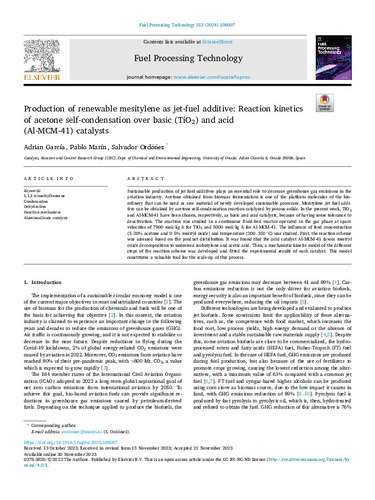Production of renewable mesitylene as jet-fuel additive: Reaction kinetics of acetone self-condensation over basic (TiO2) and acid (Al-MCM-41) catalysts
Autor(es) y otros:
Fecha de publicación:
Versión del editor:
Citación:
Resumen:
Sustainable production of jet fuel additives plays an essential role to decrease greenhouse gas emissions in the aviation industry. Acetone obtained from biomass fermentation is one of the platform molecules of the bio-refinery that can be used as raw material of newly developed sustainable processes. Mesitylene jet fuel additive can be obtained by acetone self-condensation reaction catalyzed by porous solids. In the present work, TiO2 and Al-MCM-41 have been chosen, respectively, as basic and acid catalysts, because of having some tolerance to deactivation. The reaction was studied in a continuous fixed-bed reactor operated in the gas phase at space velocities of 7900 mol/kg h for TiO2 and 5000 mol/kg h for Al-MCM-41. The influence of feed concentration (5–20% acetone and 0–5% mesityl oxide) and temperature (200–350 °C) was studied. First, the reaction scheme was assessed based on the product distribution. It was found that the acid catalyst Al-MCM-41 favors mesityl oxide decomposition to undesired isobutylene and acetic acid. Then, a mechanistic kinetic model of the different steps of the reaction scheme was developed and fitted the experimental results of each catalyst. This model constitutes a valuable tool for the scale-up of this process.
Sustainable production of jet fuel additives plays an essential role to decrease greenhouse gas emissions in the aviation industry. Acetone obtained from biomass fermentation is one of the platform molecules of the bio-refinery that can be used as raw material of newly developed sustainable processes. Mesitylene jet fuel additive can be obtained by acetone self-condensation reaction catalyzed by porous solids. In the present work, TiO2 and Al-MCM-41 have been chosen, respectively, as basic and acid catalysts, because of having some tolerance to deactivation. The reaction was studied in a continuous fixed-bed reactor operated in the gas phase at space velocities of 7900 mol/kg h for TiO2 and 5000 mol/kg h for Al-MCM-41. The influence of feed concentration (5–20% acetone and 0–5% mesityl oxide) and temperature (200–350 °C) was studied. First, the reaction scheme was assessed based on the product distribution. It was found that the acid catalyst Al-MCM-41 favors mesityl oxide decomposition to undesired isobutylene and acetic acid. Then, a mechanistic kinetic model of the different steps of the reaction scheme was developed and fitted the experimental results of each catalyst. This model constitutes a valuable tool for the scale-up of this process.
ISSN:
Patrocinado por:
Spanish Ministry of Science and Innovation, Spanish Agency for Research AEI [PDC-2021-120835-C21]; Severo Ochoa Program of the local Government of the Principality of Asturias [PA-22-BP21-016]
Colecciones
- Artículos [37541]
- Ingeniería Química y Tecnología del Medio Ambiente [354]
Ficheros en el ítem





